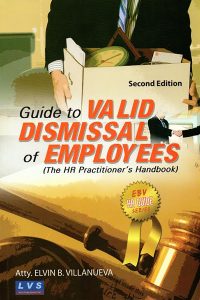Hearing or Conference, in certain situations, can be Dispensed with
Hearing or conference may not be necessary in cases where the employee admits the offense. Thus, there are instances that are exceptions to the requirement of holding a hearing or conference.
The post below is based on the book Guide to Valid Dismissal of Employees Second Edition (pp. 75-77)
 In the following instances, the Court emphasized the importance of due process:
In the following instances, the Court emphasized the importance of due process:
1. When dismissal is already apparent before due process was accorded.
2. Suspicion cannot be made as basis for dismissal. Factual findings, carefully established through orderly procedure, is required.
3. Co-conspirator’s declaration alone cannot be made as basis to dismiss. Employer at the very least must allow employee to confront the statement of the alleged co-conspirator.
4. Even if there are witnesses to the incident, investigation is still necessary.
The Supreme Court has made separate rulings on whether the defect of lack of hearing is cured by the hearing before the NLRC. In the case of Pepsi-Cola Bottling Co., vs. NLRC, the Supreme Court considered untenable the contention that the alleged defects in due process were cured when the dismissed employee was able to present his case and arguments before the NLRC. The reason is, at the time the dismissed employee presented his case and arguments before the NLRC, he had already been terminated. What the Labor Code enunciates is the procedure prior to dismissal.
But on the same issue, the Court held that the hearing before the Labor Arbiters of the NLRC is a valid substitute for hearing required of employers at the company level. What the due process clause in the constitution proscribes is the total absence of the chance to be heard. If a party was not initially given a chance to be heard at the company level, but later was given full opportunity to submit position papers or present his case and arguments before the Arbitration Branch of the NLRC, this defect is cured.
These two seemingly contradicting rulings can actually stand independently of each other since they differ in the aspect when the just cause for dismissal is upheld in the NLRC. Meaning, when the just cause is valid, then the lack of procedure at the company level is cured by the NLRC hearing. The rule does not apply in a contrary situation.
Thus, in cases where the employee was not given due process by the employer prior to his dismissal but in the course of the proceedings before the Labor Arbiter of the NLRC, it was established by substantial evidence that indeed just cause exists to support the termination of the employee, the dismissal is considered valid but the employer is sanctioned by imposing a penalty to indemnify the employee for lack of due process.
However, if the dismissal is not justified, the Wenphil doctrine and Rubberworld that the lack of due process before the dismissal of the employee was deemed corrected by the subsequent proceedings before the Labor Arbiter where the employee was given the chance to be heard, is not applicable.
The reason behind such ruling is that the finding by the Labor Arbiter as to the validity of the ground for dismissal is much more impartial and trustworthy than a determination by the employer who assumes the role of accuser and judge at the same time.

Comments (8)
… [Trackback]
[…] There you can find 23706 additional Information on that Topic: lvsbooks.com/hearing-conference-certain-situations-can-dispensed/ […]
… [Trackback]
[…] Find More on that Topic: lvsbooks.com/hearing-conference-certain-situations-can-dispensed/ […]
… [Trackback]
[…] Info to that Topic: lvsbooks.com/hearing-conference-certain-situations-can-dispensed/ […]
… [Trackback]
[…] Read More to that Topic: lvsbooks.com/hearing-conference-certain-situations-can-dispensed/ […]
… [Trackback]
[…] Find More on that Topic: lvsbooks.com/hearing-conference-certain-situations-can-dispensed/ […]
… [Trackback]
[…] Info to that Topic: lvsbooks.com/hearing-conference-certain-situations-can-dispensed/ […]
… [Trackback]
[…] Read More here on that Topic: lvsbooks.com/hearing-conference-certain-situations-can-dispensed/ […]
… [Trackback]
[…] Information on that Topic: lvsbooks.com/hearing-conference-certain-situations-can-dispensed/ […]
Comments are closed.